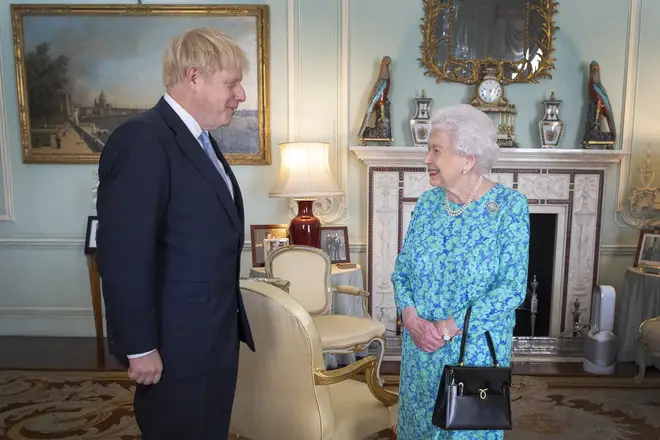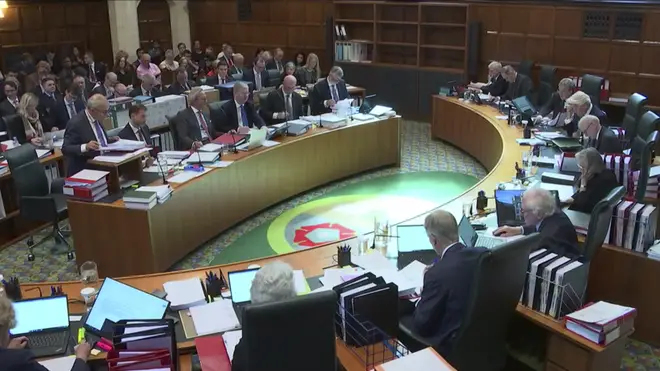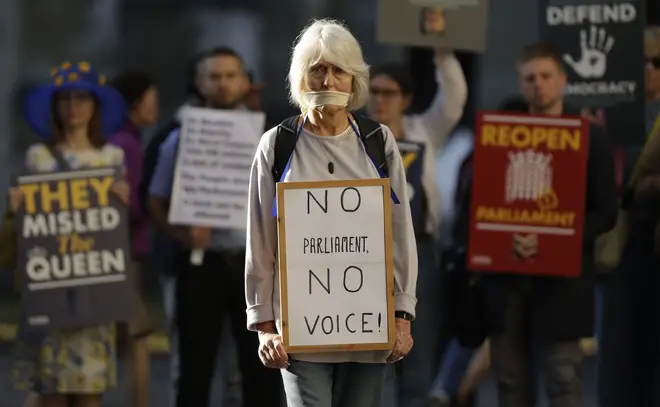
Clive Bull 1am - 4am
17 September 2019, 16:10

The prime minister will "take the necessary steps" set out by the Supreme Court if they decide his advice to the Queen regarding prorogation was unlawful.
However, speaking on behalf of Mr Johnson, Lord Keen QC did not rule out the idea of the prime minister advising the Queen to prorogue Parliament for a second time.
Lord Keen said: "I have given a very clear undertaking that the prime minister will respond by all necessary means to any declaration that the . . . prorogation was effected by any unlawful advice that he may have given."
When asked about a second prorogation, the Advocate General for Scotland said: "I'm not in a position to comment on that. That will have to be addressed by the decision maker."
It comes as the Supreme Court today heard that Mr Johnson used prorogation to 'silence' Parliament.
The prime minister's use of an "exceptionally long" prorogation was used to "silence" MPs according to lawyers for Gina Miller.
Supreme Court justices were told that Boris Johnson's decision to suspend Parliament for five weeks was an "unlawful abuse of power."
Lawyers for Gina Miller have also told the courts that the prime minister failed to provide them with a witness statement or any other evidence explaining his decision.
It comes as Mrs Miller brings a challenge over Mr Johnson's advice to the Queen to suspend Parliament.
The barrister for the Guyanese-British business owner, Lord Pannick QC, said: "The exceptional length of the prorogation in this case is strong evidence that the Prime Minister's motive was to silence Parliament for that period because he sees Parliament as an obstacle to the furtherance of his political aims."
Lord Pannick said it was "remarkable" that the prime minister had not provided any witness statement that would explain his advice to the Queen.

Today marks the start of a historic three-day appeal against two separate challenges in English and Scottish courts last week.
English courts in London decided that it was not for the courts to rule on what was a "purely political" matter, whereas Scottish courts in Edinburgh concluded the length of prorogation unlawful as its motivation was to frustrate Parliament.
It was the latter decision that Lord Pannick agreed with, suggesting that the High Court in England were being cautious.
He told the court: "Their conclusions, we say, are supported by the prime minister's own public statements as to his concerns as to what Parliament may do and the court . . . should be prepared in the circumstances to draw an inference from the absence of any evidence on the Government's side by way of a witness statement.
"We submit that on all the material the court should conclude that, but for the prime minister's wish to avoid parliamentary control, he would not have recommended to Her Majesty a prorogation for a period of longer than five weeks, but he would have recommended a substantially shorter period . . . as had occurred on every occasion . . . in the last 40 years."
Lord Pannick went on to argue that courts had never before been asked to consider these issues because no prime minister "has abused [their] power in the manner in which we allege in at least the last 50 years."

The issue raises "fundamental questions of constitutional law," although he conceded that a prime minister does have the power to advise the Queen to prorogue Parliament.
He continued: "Parliament will be silenced for a substantial part of the period leading up to the deadline of October 31 when issues of grave national importance are being addressed (or not addressed) by the Government."
It was his suggestion that Parliament would control proceedings if the courts found prorogation unlawful.
Supreme Court President Lady Hale from the outset clarified that the case only sought to decide whether Boris Johnson's advice to the Queen was lawful and would next question political matters surrounding Brexit.
She said: "It is important to emphasise that we are not concerned with the wider political issues which form the context for this legal issue.
"As will be apparent when we hear the legal arguments, the determination of this legal issue will not determine when and how the UK leaves the European Union."